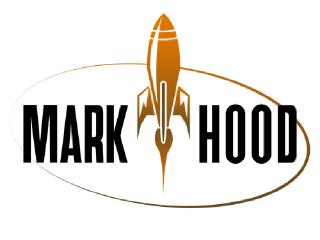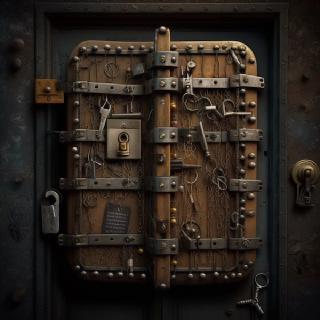Have you ever shared a book? Played a song for someone, or lent them an album you love?
What if you couldn’t?
Image generated by MidJourney
The Gatekeeper
Imagine there was someone stood in your house, always hovering beside your bookshelf. They don’t do anything, just watch you picking up any of the books you bought, reading them, putting them back and selecting another.
It’s weird having them there, but they don’t get in the way. Not until you try and hand one of your books to a visiting friend, to say ‘I loved this, you should read it too’. At that point they snatch it out of your hand and put it back on the shelf.
You try again, and once more they stop you, warning you that you’re not allowed to do that.
“But I bought it,” you protest. “I can lend it to my friend.”
“No, you can’t. And in fact, you’ve broken the rules by even trying, so I’m going to take all your books now.”
Nobody would stand for that. And yet that’s what we do (almost) every time we buy an eBook these days. And the same holds for music, movies, TV shows, software; everything digital that you think you bought is actually licensed under very restrictive terms. The devices you use to watch, read or listen are complicit, controlling the usage of the product to ensure you don’t do anything that the vendor doesn’t want you to.
This is ‘Digital Rights Management’
Physical vs Virtual
If all goods are physical, there’s a limit on how much sharing you can do. If I lend you my copy of a book, I can’t lend it to anyone else (or even read it myself) until you give it back. The same goes for a CD or vinyl album, DVD or BluRay movie. So while the producers of these items would much rather everyone bought their own copy, they can’t really enforce that.
As more and more things went digital, it was simple to make endless copies of something in your possession. If you email your friend a copy of my eBook, you still have it. You can read it any time you like, and they don’t need to return their copy either. More than that, you can email everyone you know with a copy, and they can all read them at once. Or you can put it on the internet, and everyone in the world can read it - while I only sold one copy.
Now as an author, I’d consider this a Bad Thing. Literally billions of people getting something of mine for nothing, when I have bills to pay? No thank you!
So there’s the reason for DRM - it’s not about managing the rights you have, it’s about the rights held by the producer of the content. They don’t want you to share it, so they implement technical barriers to prevent it. And they’re backed by laws that state it’s a criminal offense to bypass it.
Problem solved, right? If I sell one copy of my book, I can rest assured that only the person who bought it can ever read it. Anyone else wants it, they have to buy it too.
But people love to lend each other books. And if you buy a copy of a book, isn’t it odd that no-one else in your house can read it? If you bought a physical copy, it’s right there on the shelf… So Amazon and other stores implemented a ’lending’ permission. You can share books with people in your home, or friends, and it locks you out until they return it. Just like the old days, but you get the advantage that if they forget to return it, you can just revoke their permission and get it back without even talking to them.
The Walled Garden
That’s all at the whim of Amazon (or whoever) though. They might decide tomorrow that they don’t want to do that any more. And you’ve handed them permission to lock you out of your own books, or their entire library, at any moment.
It’s happened. Amazon removed copies of 1984 from Kindles which people bought in good faith. Microsoft shut down their eBook store and rendered everything unreadable. Numerous people have been banned from Google or Apple and lost everything they’d spent money on.
And good luck selling something locked with DRM. You can’t sell a second-hand eBook, movie or album. Decide to move from iPhone to Android? Get ready to buy everything all over again. None of your apps will come with you.
None of this helps you, the consumer. But you might still think it’s a small price to pay to help out the starving artists, right? As long as they’re getting paid, and no-one’s illegally sharing their work…
Except it hasn’t worked. Literally nothing is unbreakable, including DRM. Every book, album, movie is available online for the taking if you know where to look. The only exceptions are the ones too small to be in demand.
Because the reality is that billions of people won’t read my books. Or anyone’s. For most authors, even being discovered by your target audience is a challenge. Word-of-mouth is vital to us. Someone saying ‘hey, read this’ is the best way to get my words out there. And anything that makes that harder isn’t in my best interests.
A major publisher has gone entirely DRM-free, and saw an increase in piracy rates of precisely… nothing . That was 2012, and they’re still DRM-free today. They’ve not lost out. DRM doesn’t work.
My View
So I don’t enable DRM on my books. I don’t want them pirated, but DRM won’t stop that anyway. What it will do, is stop you moving from one device to another, or letting someone else read them.
My approach is to write the best books I can, and hope that people feel they’re worth paying for. I also build a relationship with my readers through my blog, newsletter and social media, and it feels wrong to treat you all as potential thieves and put you in digital handcuffs ‘just in case.’
If you want to read more about how DRM is harmful, I recommend the Electronic Frontier Foundation, and their site Defective by Design .

